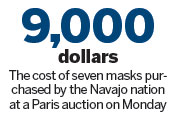Navajo go to Paris auction to buy back sacred masks
When diplomacy and a plea to return sacred ceremonial masks to an American Indian tribe in the United States failed, officials from the Navajo nation traveled to the Paris auction house selling the items and started bidding for them.
They fended off a French art collector on Monday, winning seven masks for more than $9,000. Navajo Vice-President Rex Lee Jim said the Navajo delegation had to face the reality of the auction and buy them.
"They are sacred masks ... and unfortunately they end up here. Whether that is legal or illegal ... we don't know," said Jim, a medicine man who offered prayers to the masks that embody Navajo deities. "What we do know is that they are for sale."
The Navajo nation took a different approach than its Hopi neighbor in northeastern Arizona, which has seen losses of ceremonial items to private collectors at auctions in France that were deemed legal.
The objects for sale at the Drouot auction house included religious masks that are believed to be used in Navajo winter healing ceremonies.
They also included dozens of Hopi dolls and several striking masks embellished with horse hair, bone and feathers, thought to be from the late 19th and early 20th centuries.
The US embassy in Paris asked Drouot to suspend the sale to allow Navajo and Hopi representatives to determine if they were stolen from the tribes.
But Drouot refused, arguing that the auction was in accordance with the law - and that a French tribunal had previously ruled that a similar sale was legal.

Sales from the auction totaled $1.12 million.
The Hopi saw the sale as sacrilege and did not travel to Paris for the auction, said Pierre Schreiber, a lawyer representing the tribe.
Only a member of the tribe has the right to possess the items that represent the spirits of their ancestors, tribal officials have argued.
"Hopis were opposed to buying back their artifacts as they did not want to engage in the auction," Servan-Schreiber said.
Hopi Chairman Herman Honanie said he was appalled by the latest sale.
The Navajo delegation was authorized to spend up to $20,000 to retrieve the masks that typically are disassembled after a nine-day ceremony and returned to the earth, said Deswood Tome, a spokesman for the tribe.
(China Daily 12/17/2014 page10)














